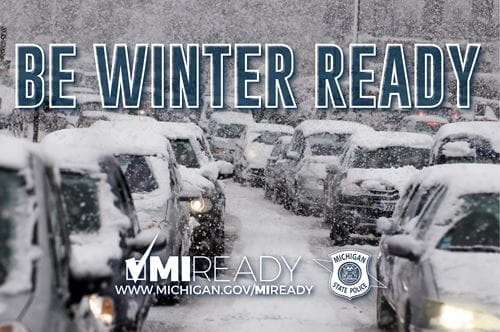The web Browser you are currently using is unsupported, and some features of this site may not work as intended. Please update to a modern browser such as Chrome, Firefox or Edge to experience all features Michigan.gov has to offer.
Winter Weather and Pets

Severe winter storms can have an impact not only on people, but can impact animal health. Pets are at risk during severe winter weather due to wind chill factors, hypothermia and frostbite. Make plans for your pets in the event you will need to evacuate.
Before a winter storm:
- Create an emergency supply kit for your pet that includes:
- Leash and collar
- Transport carrier
- Food and water (5-7 day supply)
- Any medications
- Vaccination history, rabies certificate
- Waste disposal supplies
- A blanket
- Favorite toy
- Your veterinarian’s contact information
- Special supplies for pets such as birds, pocket pets or reptiles (e.g., heat lamps)
- Make sure pets are current on all vaccinations.
- Develop an evacuation plan for your pets.
- For public health reasons, many evacuation shelters will not be able to accept pets.
- Identify pet-friendly locations in case you need to evacuate. petswelcome.com is a good source.
- Check with boarding facilities, pet-friendly hotels, veterinary clinics or relatives or family friends outside the impacted area.
- Identification
- All pets should have some sort of identification, like a collar with a tag and microchip.
- Take a photo of the pet and keep it with the medical records.
- Include any proof of ownership materials, such as registration, proof of purchase, adoption records and microchip information.
During a winter storm:
- Bring your pets inside immediately.
- AVOID leaving pets behind.
- If there is no other alternative, leave them loose inside your home with food and plenty of water.
- NEVER leave your pet chained outside or in enclosed in a way they cannot escape danger.
After a winter storm:
- Be aware that a pet’s behavior may change before, during and even after a disaster.
- Familiar scents and landmarks may be altered and your pet may become confused and lost. In the first few days after the disaster, leash your pets when they go outside.
- Always maintain close contact.
- Reintroduce food in small servings, gradually working up to full portions, especially if animals have been without food for a prolonged period of time.
Winter-related illnesses:
Animals that have prolonged exposure to low temperatures, wind or moisture can result in a cold-related illness for pets.
If any of these conditions are suspected, seek veterinary care immediately for your pet(s).
Antifreeze:
- Ingesting anti-freeze can be fatal for a dog or cat. If you spill anti-freeze, clean it up immediately.
Frostbite:
- Signs of frostbite may not be obvious at first and may not show for several days when it comes to pets.
- Signs of frostbite: white, waxy or pale appearance to extremities (toes, nose, ears, tail); skin is cold and numb with loss of feeling; sloughing or shedding of skin.
- Pets can easily get frostbite on their ears, tail and paws. If your pet goes outdoors, be aware of the current temperatures and wind chill.
Hypothermia:
- Hypothermia occurs when the core body temperature drops to a level at which normal muscle and brain functions are impaired.
- Pets can become hypothermic after being in cold temperatures for long periods of time or from being wet in cold conditions.
- Signs of hypothermia: Extreme shivering, slow shallow breathing, gums may be pale or blue, pet is unresponsive.
- Warm your pet’s body SLOWLY. Start with warming the body core first, NOT their extremities.
- Do not give your pet anything HOT to drink. Instead give them warm broth or warm food.
If you can’t bring your pet inside:
- Have adequate shelter to keep them warm.
- Never leave your pet chained outside or enclosed in area that they cannot escape danger.
- Pets that live outdoors should be fed more in the winter. They will need the extra calories to stay warm.
- Remember to provide fresh water frequently and ensure that the water does not freeze.
- Check to make sure that access to food and water is not blocked by snow, ice or other obstacles.
- Use a plastic dish instead of a metal bowl to prevent your pet’s tongue from freezing to it.
If your pet goes outdoors:
- Most long-haired or full-coated dogs are fine in the winter time with their own natural coats.
- Shorter-coated dogs need a dog coat to protect them from the snow, wind and cold temperatures.
- Check your pet’s paws upon their return to make sure that there is no ice buildup between the toes, or that salt or ice melt is not irritating the skin.
- Never leave your pet alone in the car for prolonged periods during winter. Your can become a freezer quickly.
Source: www.Prep4AgThreats.org